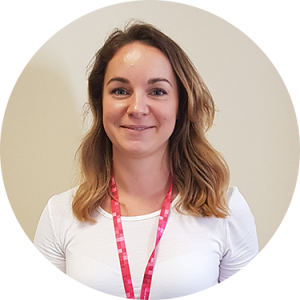
A researcher has joined the Wolfson Centre for Young People’s Mental Health, working in partnership with the DECIPHer Centre at Cardiff University.

Dr Rebecca Anthony joined the team in April 2021 and will work primarily in the Wolfson Centre’s research workstream focusing on schools and the role they play in promoting positive mental health in young people, led by Professors Simon Murphy and Graham Moore.
Dr Anthony completed her Ph.D. at Cardiff University in 2019. Rebecca’s research interests include the relationship between aspects of family functioning and children’s psychological well-being, with her Ph.D. using data from the Wales Adoption Study, focusing on the experiences of families following an adoptive placement.
Her research interests are in the area of improving outcomes for children, with a focus on children and young people who have experienced care. Dr Anthony is already underway in supporting the planned work of the Wolfson Centre and drawing on her academic research background as a Research Associate.
Dr Anthony said “I’m really excited about my role supporting the work of the Wolfson Centre and continuing my ongoing work at DECIPHer.
“I chose to get into a career of mental health research because I have seen first-hand the serious consequences of mental health problems within my own family and am keen to do work that aims to better understand mental health challenges and support young people and their families who are facing those challenges.”
“As we understand more about the risk and protective factors contributing to the development and maintenance of mental health conditions, we can use this knowledge to develop and evaluate interventions to try and prevent mental health problems developing as well as those to help aid recovery.”
Dr Anthony added: “There are a number of key challenges to overcome in the field of mental health. I think there needs to be more of an investment in mental health interventions and treatments. The waiting lists to see a professional are too long and often only available at times of crisis. Too many people are falling through the gap as they are not unwell enough to meet thresholds for certain services but the services available to them may not be effective or may take too long to access.”
While it is great to see more public discussion of mental health problems, including from celebrities through accessible forms like social media, I think there is still a long way to go in terms of viewing mental health in the same way we view physical health.
“I’m pleased to be a part of the research team at the Wolfson Centre for Young People’s Mental Health. After the past 18 months, the Centre’s planned work couldn’t be more timely or needed as we know 1 in 5 young people were reporting high levels of poor mental health prior to the COVID-19 pandemic.
We are currently working on several projects, including looking at how children feel about their transition from primary to secondary school now compared to pre-COVID. We are also looking at trends in depressive symptoms over time and the contribution of aspects such as cyber-bullying and social media use.
Dr Anthony concluded: “It’s a really exciting time to enter the field, with connections being made between professionals in different disciplines including psychology, epidemiology, genetics, and neuroscience. We are learning more and more and through putting this learning into practice there is a real opportunity to make a difference in young people’s lives and I look forward to playing my part in that at the Wolfson Centre over the coming years.”
This article first appeared on the Cardiff University website.